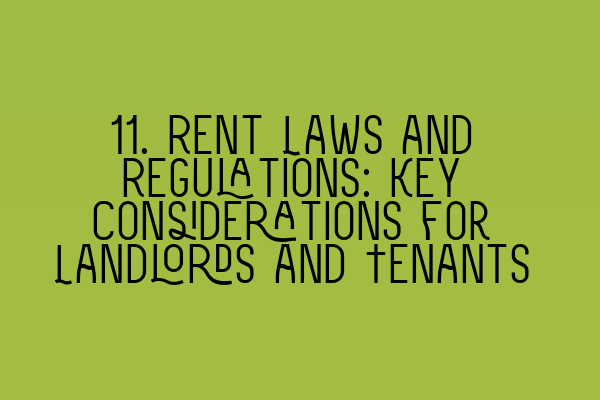**11. Rent Laws and Regulations: Key Considerations for Landlords and Tenants**
As a landlord or tenant, it is crucial to have a thorough understanding of the rent laws and regulations in order to navigate the rental market successfully. Many disputes and legal issues can arise if either party is unaware of their rights and responsibilities. In this blog post, we will explore the key considerations for landlords and tenants when it comes to rent laws and regulations.
**1. The Importance of Tenancy Agreements**
One of the first things both landlords and tenants need to ensure is the existence of a well-drafted tenancy agreement. This legally binding document outlines the terms and conditions of the tenancy, including the rent amount, payment schedule, duration of the tenancy, and rights and responsibilities of both parties. A detailed and comprehensive tenancy agreement helps to prevent misunderstandings and disputes in the future.
**2. Rent Control and Rent Increases**
Rent control is a significant aspect of rent laws and regulations that both landlords and tenants should be aware of. Some jurisdictions have rent control laws in place to limit the amount landlords can increase rent over a specific period. It is essential for landlords to understand the applicable rent control laws in their area to avoid any legal issues. Similarly, tenants should familiarize themselves with these laws to ensure they are not subjected to unfair rent increases.
**3. Security Deposits**
Security deposits are commonly required by landlords as a form of financial protection against any damages or unpaid rent at the end of the tenancy. Both landlords and tenants need to know the regulations surrounding security deposits, including the maximum amount allowed, the timeline for their return, and the conditions for deductions. It is advisable for landlords to provide tenants with a written receipt for the security deposit and keep it in a separate account as required by law.
**4. Repairs and Maintenance**
Landlords have a legal obligation to ensure that the rental property is safe and habitable. This includes conducting necessary repairs and maintenance to keep the property in a good condition. Tenants should promptly report any repairs required, and landlords should respond promptly to address them. Moreover, it is essential for both parties to understand who is responsible for specific repairs and maintenance tasks, as outlined in the tenancy agreement or local regulations.
**5. Evictions and Termination of Tenancy**
In certain situations, landlords may need to evict a tenant due to violations of the tenancy agreement or non-payment of rent. However, it is crucial to strictly follow the legal process outlined by the rent laws and regulations in your jurisdiction. Similarly, tenants should be aware of their rights regarding eviction and the notice period required to terminate their tenancy. Failure to adhere to the legal process can result in costly legal battles for both parties.
**6. Discrimination Laws**
Discrimination in the rental market is strictly prohibited by law. Landlords cannot refuse to rent a property, set different terms and conditions, or terminate a tenancy based on factors such as race, religion, gender, disability, or familial status. It is crucial for both landlords and tenants to be aware of these discrimination laws to ensure fair and equal treatment throughout the rental process.
**7. Occupancy Limits**
Landlords should be aware of any occupancy limits imposed by local laws or regulations. These limits determine the number of people allowed to reside in a rental property based on factors such as the property’s size and amenities. Violating occupancy limits can result in legal consequences for landlords. Tenants should ensure that the occupancy limits are clearly defined in their tenancy agreement to avoid any misunderstandings.
**8. Changes in Rent Laws and Regulations**
Rent laws and regulations can change over time, so it is essential for both landlords and tenants to stay updated with any amendments or new legislation. This can be done by regularly checking local government websites, consulting legal professionals, or attending seminars and workshops on rental regulations. Keeping up with these changes helps landlords and tenants avoid potential legal pitfalls.
**Conclusion**
Understanding rent laws and regulations is vital for landlords and tenants alike. It not only helps prevent disputes and legal issues but also ensures a fair and transparent rental process. By having a well-drafted tenancy agreement, being aware of rent control laws, understanding security deposit regulations, complying with repair and maintenance obligations, following eviction procedures correctly, adhering to anti-discrimination laws, respecting occupancy limits, and staying updated with any changes, both landlords and tenants can create a positive and mutually beneficial rental experience.
For more information on legal topics related to property law and land law, consider checking out our related articles:
1. [SQE 1 Practice Exam Questions](https://fqps.co.uk/sqe/sqe1-preparation/mcq-practice-quiz)
2. [SQE 1 Practice Mocks FLK1 FLK2](https://fqps.co.uk/sqe/sqe1-preparation/practice-mocks-quiz)
3. [SQE 2 Preparation Courses](https://fqps.co.uk/sqe/sqe2-preparation)
4. [SQE 1 Preparation Courses](https://fqps.co.uk/sqe/sqe1-preparation)
5. [SRA SQE Exam Dates](https://fqps.co.uk/sqe/sqe1-sqe2-exam-dates)
At SQE Property Law & Land Law, we are committed to providing you with the most up-to-date and comprehensive information to help you navigate the complex world of property law. Contact us today for expert legal advice and assistance with your property-related matters.
